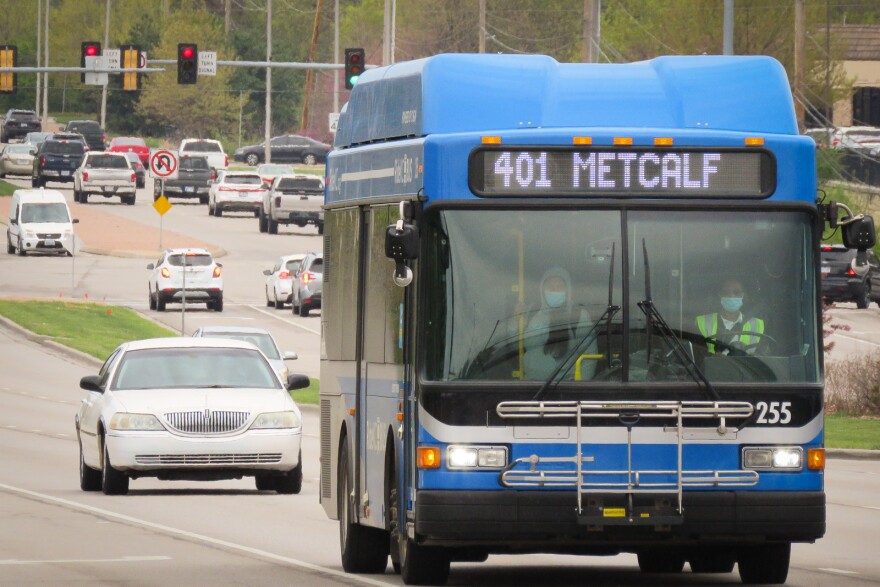A former top finance official for the Kansas City Area Transportation Authority is suing the agency for firing him after he raised alarms about the KCATA’s “unsustainable” spending habits.
Michael Graham was the senior vice president and chief financial officer of the regional transit agency. He alleges that after he voiced concerns about the KCATA’s finances, the agency’s top officials retaliated against him until he was ultimately fired last June. His lawsuit states the agency’s actions violated the Missouri Human Rights Act and the Age Discrimination in Employment Act.
The lawsuit was originally filed in Jackson County Circuit Court but was removed to federal court in Kansas City. Graham’s attorneys are requesting a jury trial.
According to the lawsuit, the KCATA was spending more money than it took in for several years before Graham was fired. The suit claims the agency fell short because of inadequate funding and overspending on the RideKC branding campaign.
The bulk of KCATA’s budget comes from two Kansas City sales taxes. The lawsuit alleges tax income left the agency “without sufficient revenue to cover its expenses.”
E.E. Keenan, one of Graham’s attorneys, said Graham repeatedly expressed concerns about the KCATA’s finances.
“Mr. Graham is bringing this suit to stand up for his rights and the rights of all working people to speak the truth about what is happening inside an organization and how public funds are being used,,” Keenan said.
“We only get funds used the right way, though, if people who work in government agencies know that they're free to speak up about misuse.”
The KCATA denied the allegations and said the agency does not comment on pending litigation.
During his 32 years at the agency, Graham noticed Chief Operating Officer Jameson Auten and former President and Chief Executive Officer Robbie Makinen “liberally spending funds” from the KCATA’s reserves, reducing them from $30 million to $6 million.
When Graham asked about the agency’s finances, he alleges Makinen told him to “Take a dull pencil and stab yourself in the eye.”
Makinen later told Graham to use federal funds that are typically reserved for new construction or improvements to “‘hide the imbalance’ of the projects the sales tax were being used for.”
Graham told Auten and Makinen in early 2022 that the agency was having “significant financial problems” and that their spending habits were unsustainable. Graham said they needed to find another funding source outside of the sales tax or face “serious budget problems.”
In response, the lawsuit alleges that Makinen told Graham to hide the financial imbalances, but Graham refused. In early May, the lawsuit says Makinen called Graham a “liability” and said he “needed to go.”
On May 12, 2022, the lawsuit says Auten asked Graham for an “exit plan” from the transit authority because Kansas City officials were questioning how the agency spent funds.
On May 16, Graham sent an email saying the KCATA was engaged in age discrimination and unlawful retaliation because the agency had begun laying off older employees. The lawsuit says Graham was placed on a leave of absence following that email. He lost access to his email account and the KCATA network, and the agency took his computer and keys.
Graham filed a discrimination charge with the Missouri Commission on Human Rights and the Equal Employment Opportunity Commission in May, then sent a follow-up email to KCATA management saying he wants to return to work.
The KCATA terminated Graham’s employment on June 21. He was 63. Graham is still working in the public sector.
Tensions between KCATA and City Hall
During a City Council meeting last May when the KCATA’s annual contract was up for review, council members questioned how the agency was using its $60 million allocation from Kansas City.
Post-pandemic, buses are running fewer routes and running less frequently, drawing complaints from city officials and bus riders that the transit system has become inefficient. The KCATA has previously attributed this issue to a shortage in bus drivers. This past January, the KCATA board of commissioners approved a $117 million operating budget.
The KCATA has received $152.9 million in COVID-19 relief funds from the federal government. At the city council meeting, council members asked why the KCATA has cut routes even as revenues have been up.
4th District Councilman Eric Bunch asked why the KCATA ran more routes pre-pandemic when the city was providing less money to the agency and had no federal COVID-19 relief funds.
“I can draw like one of two conclusions here,” Bunch said. “One is that something else is happening here. The books are bad or we're siphoning off money to other things. Or were we getting more service in the past than what we're paying for?”
Richard Jarrold, vice president of regional planning and development said the agency has been receiving less money from the city since officials eliminated bus fares in 2019. He said that usually brought in $8-9 million annually. He said the KCATA made up the difference by applying for federal funding and dipping into reserve funds.







